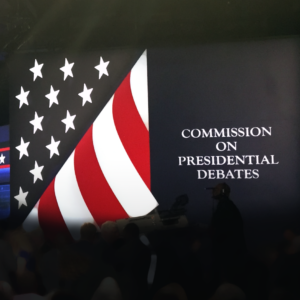Case Study
 At a Glance
At a Glance
- The Client: The Commission of Presidential Debates (CPD), a nonprofit, nonpartisan, 501(c)(3) corporation established in 1987
- The Mission: To proactively protect the CPD’s systems, leadership, and the U.S. presidential debates
- The Reason: Presidential debates are a critical part of the U.S. democratic process
- The Methods: Volexity’s proprietary assessment, monitoring, review, counsel, and other services
The Challenge
2016’s historically contentious United States presidential election saw, for the first time, cyber security at the forefront of an election cycle. Any individual or organization associated with the elections became a potential target for a variety of threats, from the theft and disclosure of internal documents and private communications to threats against the voting infrastructure.
As a result, the election saw an unprecedented level of external influence caused by the release of compromised information obtained through phishing, hacking, or leaks. Moreover, these breaches made national and international news on a weekly basis— along with potentially distorted or fabricated accounts of political events that made it difficult to sort true news from “fake news.”
Despite these challenges, the U.S. democratic process continued. Besides primary and general elections themselves, a pivotal part of the process were the debates between candidates and their running mates. The debates offer voters the chance to hear, directly from the candidates, where they stand on various issues, as well as to see how the candidates conduct themselves. Consequently, the debates have the largest audience of any of the televised campaign events.
The U.S. Presidential and Vice Presidential debates are sponsored and produced by the Commission on Presidential Debates (CPD). The CPD is a nonprofit, nonpartisan, 501(c)(3) corporation established in 1987 to steward this important democratic institution. Since 1988, CPD has sponsored and produced all of the Presidential debates. It also plays an important role internationally in helping other countries that strive to make candidate debates part of their own electoral process.
Not only do the televised debates attract tens of millions of viewers globally; but the CPD also has certain openness and transparency goals. For example, in order to engage younger voters in the election process, the debates are typically held on college and university campuses, which compete for the opportunity to host an event.
The CPD must coordinate with the campaigns and candidates, national media, local and federal law enforcement, and the colleges and universities. Within a period of a couple of months, the CPD and debate host sites must architect, procure, test, and deploy a secure infrastructure for one of the highest profile events in the world.
Due to increasing cyber threats and the importance of its responsibilities, the CPD wanted to take proactive steps to protect their systems, their leadership, and even the debates themselves.
The Solution
In order to position itself against these increasing cyber security challenges, the CPD turned to respected organizations known to it to learn how they were addressing these issues. Many of these organizations already relied upon the Washington, D.C.-based security firm Volexity to assist them in their efforts to battle advanced and targeted threat actors from their networks, monitor for ongoing threats, and to advise them on how to bolster their security posture against future threats. They referred Volexity to the CPD, and Volexity in turn began to work with the CPD in a comprehensive way to support its critical mission by improving its overall cyber security posture.
The Benefit
Volexity worked with the CPD, the host universities, local and federal law enforcement agencies, and other supporting organizations who dedicated their time and energy to make sure these events were a success.
The 2016 Presidential and Vice-Presidential debates were successfully hosted at Hofstra University, Longwood University, Washington University in St. Louis, and the University of Las Vegas, Nevada, without incident. The combined viewership for the debates was in the hundreds of millions of viewers — the highest number of viewers in televised debate history.
